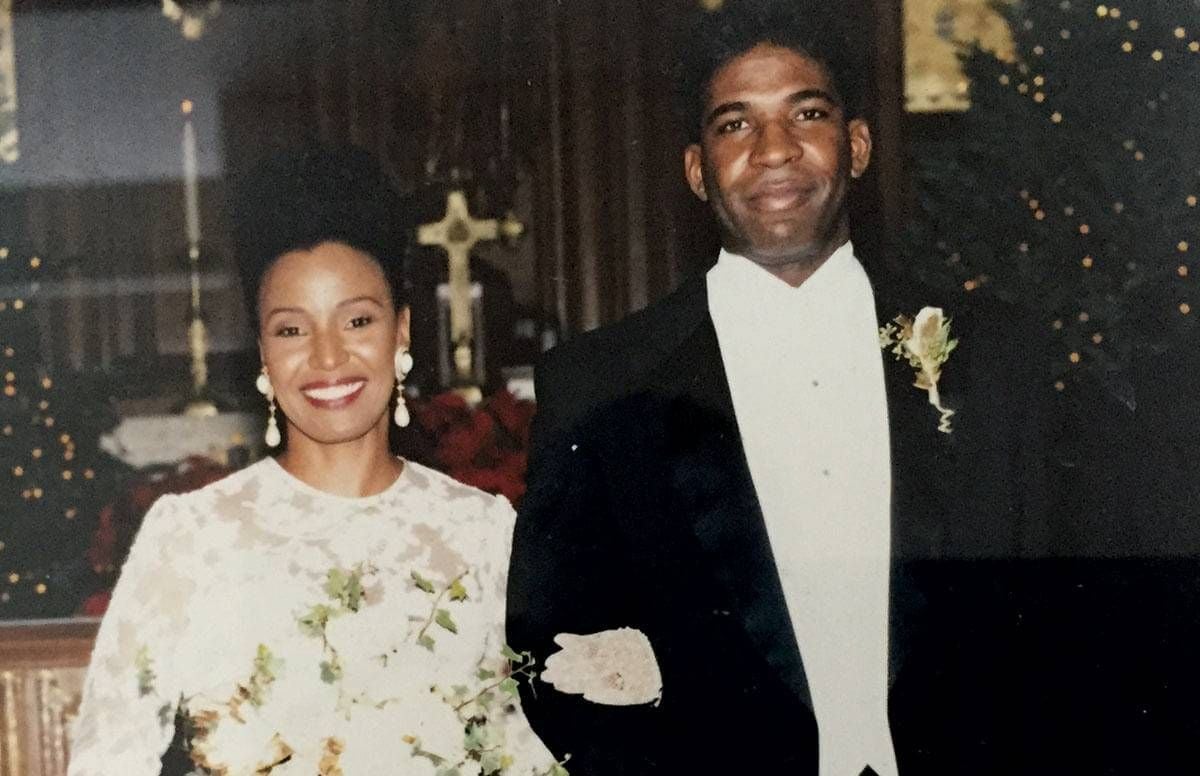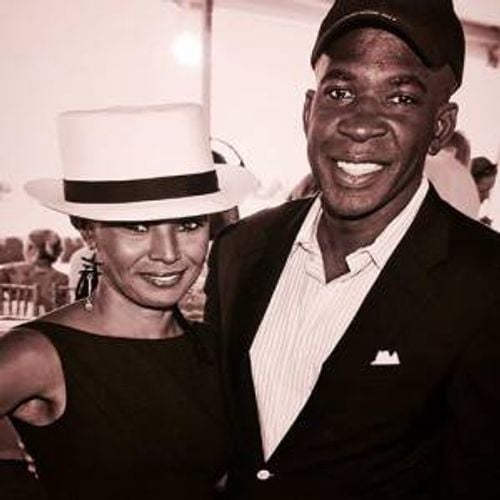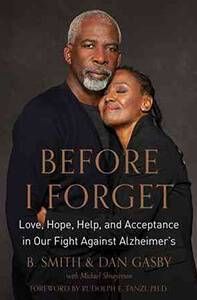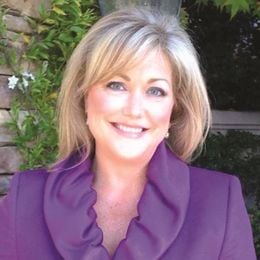Side by Side With B. Smith In Her Alzheimer's Fight
After B. Smith's death, Next Avenue is republishing our story about her
(Editor's note: Former model turned restaurant icon B. Smith, has died, five years after announcing she had been diagnosed with early-onset Alzheimer's disease. She was 70. Smith was a leader in raising awareness about Alzheimer's among African Americans, going public about her diagnosis in 2014 and co-writing with her husband Dan Gasby a book about living with the disease, Before I Forget: Love, Hope, Help, and Acceptance in Our Fight Against Alzheimer's. They were honored with the Public Leadership in Neurology Award from the American Brain Foundation. Next Avenue published a story about Smith's Alzheimer's fight in 2016, shortly after the release of the book, and is republishing it below.)

Dan Gasby and his celebrated wife B. Smith (known as Barbara to family and close friends) have always been partners — in love, in business, in life. As a former model turned lifestyle icon with cookbooks, restaurants, a line of home goods at Bed Bath & Beyond and host of her own TV show, Smith had built a wonderful life and achieved fame with Gasby’s management of her personal brand.
But after 22 years of marriage, Gasby writes in their new book, Before I Forget, he and Smith started having struggles. He worried their marriage was in trouble. It began as small arguments, with Smith becoming more distant and angry, a side he had never seen in his wife before. When a reliable, punctual Smith began showing up very late for important business meetings or missing them all together, Gasby knew something was wrong.
But after an alarming 2012 Today TV segment where the ever-chatty and effervescent Smith went silent and stared blankly at her co-hosts for what seemed an eternity, Gasby knew this was no midlife crisis. A series of medical tests and visits with specialists in Manhattan where they lived led the couple to hear a word they never thought would apply to either of them: Alzheimer’s. Smith was only 62.
“B. has always been fearless, she has never been afraid of anything,” Gasby told me during a break from their book tour while they were in Birmingham, Ala. “But both of us sat there in shock after the doctor told us B. had early-onset Alzheimer’s disease. Little did we know the journey we were about to take. But we both knew it was flight or fight and we are both fighters. I knew wherever we were going, we’d take the steps together just like we’d always done.”
Being Present and Patient
That was three years ago. Since then, the couple have sold their Manhattan apartment and moved to their Sag Harbor, N.Y., coastal home. The soothing sea sounds and walks along the beach — together or alone but always with their cherished dog, Bishop — are a comfort to them both as they cope with this difficult diagnosis.
Smith is one of only 45 percent of Alzheimer’s sufferers or their caregivers who report being told of their diagnosis, according to the Alzheimer’s Association. The organization reports that just 5 percent — about 200,000 — of the more than 5 million living with the disease receive a diagnosis of early-onset Alzheimer’s, meaning it occurs in their 40s, 50s or early 60s. This awareness has made it easier and harder for the couple.
They tackled the writing of the book (with help from Vanity Fair contributing editor, Michael Shnayerson) as they tackled everything — together. Both Gasby and Smith wrote chapters about how they were feeling through the years since Smith’s diagnosis.
Gasby’s passages are filled at times with hilarity and at times heavy-hearted emotion. Some situations he calls the “WTF” moments help give a humorous theme to the chapters he writes. One example has Gasby learning to manage his ongoing frustration with not being able to convince his wife to let him hire someone to help her organize her once pristine, but now chaotic, closet (he would not dare attempt the job). Then there are the more melancholy chapters about losing his lover, the woman he calls “sweetie,” whose flirtatious, affectionate nature before and after making love is now dimmed.
“I have learned the greatest language of all: patience,” he explained to me. “I came to a realization that Alzheimer’s had not just changed B., it changed me too. I also realized my frustrations weren’t really with B. they were with this disease, and that helped me let go when I found myself getting annoyed at her.”

While Gasby’s writing is educational, especially his quest to understand the science and research around Alzheimer’s, Smith’s chapters are even more poignant since she knows one day she won’t remember any of it. Perhaps the most compelling of her writings is when she is mad about not being able to drive or when she is sad thinking she will visit her parents in Pennsylvania and then slowly remembers they passed away several years ago.
A Plea for Research Participation
Gasby’s urgency in seeking treatments and a possible cure for the disease has led him and Smith to support the Brain Health Registry. Last year, Smith filmed a PSA for this online effort to encourage participation, especially among minorities, for clinical trials.
“While African Americans represent about 14 percent of the population, they bear over 30 percent of the costs of Alzheimer’s disease,” said Stephanie Monroe, executive director of AfricanAmericansAgainstAlzheimer’s. Launched in 2013, the organization is dedicated to labor intensive in-person community engagement to educate African Americans about the disease and to encourage more participation in clinical trials so essential to finding a cure.
Its report published and presented to the Congressional Black Caucus states that African Americans are over-represented when it comes Alzheimer’s but under-represented when it comes to research.
“The stigma in certain cultures and communities — especially among African Americans and Latinos — prevents many from ever receiving a diagnosis,” continued Monroe. “While early diagnosis can lead to treatments and drugs which are helping to slow the progression of Alzheimer’s, a later diagnosis offers fewer interventions. And with less participation in clinical trials, the hope of finding a cure is much more challenging.”
Jill Lesser, president of the USAgainstAlzheimer’s network that includes AfricanAmericansAgainstAlzheimer’s, said the focus of the organization is to find a cure for this disease by 2020.
“Most of those who are symptomatic of Alzheimer’s are probably already 10 to 15 years into the disease,” explained Lesser. “One of our research projects called Galaxy is designed for younger participants who don’t have any symptoms. We’re taking a very disruptive approach to ending Alzheimer’s.”
Dreaming, Gardening, Creating a Vision
Gasby says he and Smith decided to launch their book on Martin Luther King Jr. Day because, “He was a hero of mine and he had a dream which we are still fulfilling,” said Gasby.
When I commented that he and B. are great examples of King’s legacy of pursuing a dream, he said, “I like to think of it more as a vision and a hope for future generations. Some day in the not too distant future, I would love to know little children are learning about Alzheimer’s disease — something they know nothing about because it doesn’t exist (anymore).”

He believes that in the same way we think today about smallpox or polio — diseases that devastated populations in the past but for which we found a cure — we have the ability to end Alzheimer’s. “But you cannot pray or talk this disease away,” said Gasby. “We must act — it’s like voting or participating in civil rights — you need to get out there and do something.”
Smith is now in stage 5 of the 7 stages of the disease. Gasby told me it helps him to share his emotions — the good, bad and ugly — on Facebook. He said it’s like taking the top off a steaming, screaming kettle — once the pressure is released, you feel better. The feedback he gets on social media is instant and encourages him that he and Smith are making a difference.
“Right now, I’m in the bargaining stage, I’ve done denial and anger and now I’m buying time in hopes that a cure will arrive,” shared Gasby, referring to the five stages of grief identified by author and psychiatrist Elisabeth Kübler-Ross.
He admits that caregiving is the hardest role he has ever had to play. While he and Smith have a close circle of family and friends, they have watched some “friends” slowly disappear because of their situation. He says that's OK with him.
“I look at it like having a garden where you need to pull some weeds out, fertilize the ground and the remaining plants grow even more strong and beautiful,” explained Gasby.
“Caregiving is a club I thought I would never join, I didn’t even really know it existed,” he continued. “But caring for B. has made me a more complete person. You don’t really know who you are until you’ve faced real adversity and this is the hardest thing I’ve done. But my sweetie is worth it.”

Sherri Snelling is a corporate gerontologist, speaker, and consultant in aging and caregiving. She is the author of “Me Time Monday – The Weekly Wellness Plan to Find Balance and Joy for a Busy Life” and host of the "Caregiving Club On Air" podcast. Read More

